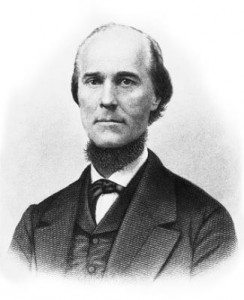Georgia’s governor Joseph Brown, a Southern Baptist, remains a vocal critic of the Confederate government’s conscription law. Brown stands out among Confederate state governors as the strongest advocate of states’ rights within the Confederacy. The governor’s concern is that his state is being forced to contribute soldiers to the national Confederate effort without receiving enough protection in return against the Union’s presence in Georgia’s coastal regions. He also criticizes suspension of the writ of habeas corpus, as well as taxes laid by the Confederate government.
Confederate politicians are quite familiar with the power of the states’ rights argument. Prior to the war, Southern politicians had invoked states’ rights doctrine as a political tool to protect the institution of African slavery. (On the other hand, Southern politicians prior to the war had argued against the states’ rights of Northern states when those states invoked states’ rights in refusing to return runaway slaves to the South.) During secession, states’ rights became the political means of justifying Southern states leaving the United States in order to preserve slavery. Now, ironically, the doctrine of states’ rights is utilized by both Gov. Joseph Brown and North Carolina Gov. Zeb Vance to protest the heavy handed actions of Confederate President Jefferson Davis and Confederate generals that infringe upon their respective states. For his part, Brown seemingly relishes the power he wields as governor and is popular among the citizens of Georgia.
Today the Confederate Union newspaper of Milledgeville (Brown’s home town) offers commentary concerning the difficulties between Brown and the Confederate government.
The military and political correspondent of the Savannah Republican, “P. W. A.” in a late communication to that paper makes the following statement and insinuation:
“The truth is, Georgia has but little influence at Richmond. Without undertaking to pass judgment upon the merits of the controversy between Governor Brown and Mr. Davis, I but announce a simple fact in saying, that one of the results of their quarrel has been to deprive the State of much of its weight in the government, and amongst the people of other States.”
This statement was made in connection with the writer’s remarks upon Gen. Toombs’ resignation, and in reference to the fact that whilst many of Gen. Toombs’ juniors, far inferior to him in point of talent had been promoted he was suffered to remain a Brigadier. The inference which the writer, no doubt, intends his readers to draw from his statement is, that Gen. Toombs and other Georgians have not had justice done them by the President, and that the State of Georgia had lost its influence with the Government at Richmond, because Governor Brown had presumed to differ with the President upon the constitutionality of the conscription law. We cannot believe this assumption. If it is true, President Davis is not the man we have taken him for. There is no State in the Confederacy that has answered every call made upon her by the President more promptly than Georgia. We have seen a statement from President Davis himself, acknowledging the promptness with which Georgia had responded to all his calls upon her for troops, and declaring that if all the other States had been as prompt there would have been no need of a conscription, and it is well known that the Government at Richmond was indebted to the prudence and foresight of the Governor of Georgia for the means of manufacturing gun powder at the commencement of the war. To say that President Davis is punishing the whole state of Georgia because the Governor of Georgia differed with him on a principle, without involving any opposition in action, is to assert that the President is destitute of common sense or common honesty, and we don’t believe it. P. W. A. has been misinformed, or the story has been gotten up for mischief.–The Savannah Republican in which this statement first appeared seems to be laboring to create an issue between the Government at Richmond and Georgia. Outside of that paper we believe there is no controversy between the two Governments, and we do not believe the Republican, with all his industry and zeal in the cause, will be able to do much mischief.
Source: Joseph E. Brown (link); “Can it be Possible?”, Confederate Union, March 24, 1863 (link)



